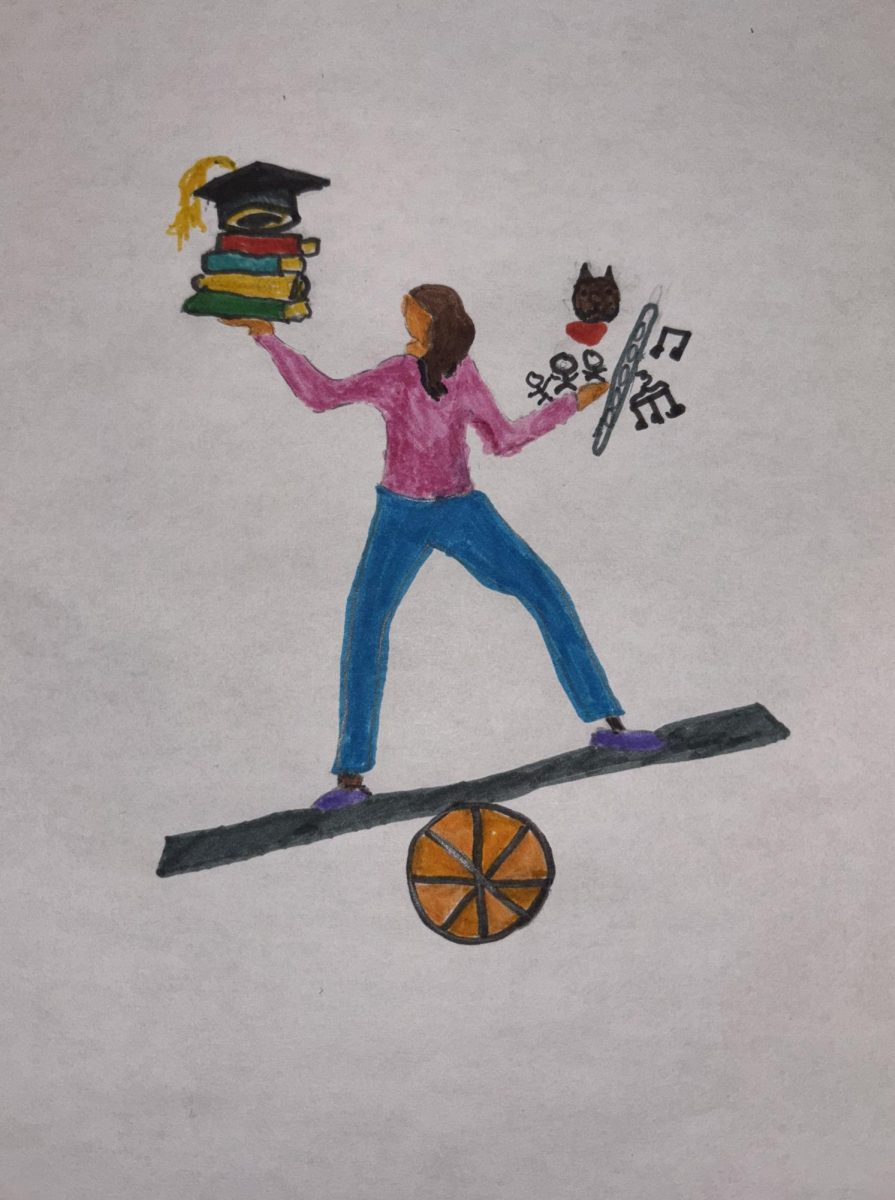Through four strenuous years in high school, there are often immense pressures and high expectations that students must prevail over. As students embark on preparing for college, they are recommended to enroll in rigorous courses such as the Advanced Placement (AP) classes to captivate their top colleges. Such classes establish a student’s determination by presenting college-level exams along with copious amounts of homework. In addition to the heavy workload, students are also encouraged to partake in activities outside of their classrooms. Some participate in sports, others engage in school musicals, and some even find employment within their communities. Thus, with both school and extracurriculars presenting a surplus of responsibilities, students have difficulty in finding the ideal balance.
Even though navigating such obstacles can bring about stress, fostering a rigid sense of balance and setting one’s priorities straight can aid in mitigating anxiety. It is often noted that students attempt to accomplish more than they are capable of. Hence, it is suggested to set realistic goals and learn to reject certain activities that will only bring more stress. By setting a strict limit on what one can handle while simultaneously prioritizing one’s personal well-being, students can alleviate their workload.
Moreover, a Princeton Review article entitled “12 Tips to Balance Academics and Extracurricular Activities” (www.princetonreview.com) explains the significance of timing one’s responsibilities and taking breaks to avoid burnout and recharge. In order to attend to all of one’s duties, an individual should plan accordingly and make a list. By taking the time to acknowledge all tasks at hand, individuals can plan ahead and divide the workload into sections. Furthermore, it is equally important to regularly take breaks, allowing oneself to regain focus. Individuals who avoid procrastination and allow themselves respite ultimately triumph over lingering anxiety.
Students at LHS shared how they balance school and extracurriculars. Junior Andrew Callaghan, who is currently taking three AP courses, expressed his thoughts: “Personally, for me it is very hard to balance everything, especially when we receive lots of homework. I try to manage my time by waking up early and staying up late to finish all my schoolwork.” Callaghan is one of the many high school students who often stay up late to manage academics, which can ultimately lead to exhaustion. This strategy works for many students, but it often comes at the cost of their mental health. Teenagers overlook the benefits of sleep, despite its benefits in boosting cognitive function and enhancing memory and recollection.
Freshman Steven Michelakos explained, “I am in soccer and swimming, and the advice I can give [to others] is to learn how to manage your time; it will help you become a better student overall.” Michelakos highlighted the significance of effective time management. Time management increases one’s productivity and helps one achieve more free time to then engage in enjoyable activities. Increased productivity also aligns with insightful decision-making as a student is analyzing all possible outcomes. Lastly, junior Molly Doran, who has been swimming since the third grade and is on the varsity swim team, said, “A lot of times my practices are at the same time from 4-6 PM. So, after school, I go to practice and finish my work afterwards.” She continued, “I would advise others to manage everything and stay on top [of your tasks]. Also, a lot of times if you cannot finish everything in one night, you can always wake up early. Don’t procrastinate.” That said, it is clear that each student has his/her own personal strategies to implement in aiding his/her success in all aspects of life. It is significant to find one’s own strategy and modify it to one’s own schedule until the individual is comfortable with it.
Establishing the ideal balance between one’s academics and extracurriculars can be viewed as unattainable; however, it is through a student’s persistent diligence and resolution that he/she can navigate through the mayhem of responsibilities. By committing oneself to tasks while prioritizing personal health, one can enhance growth and maintain a fulfilling life.






















